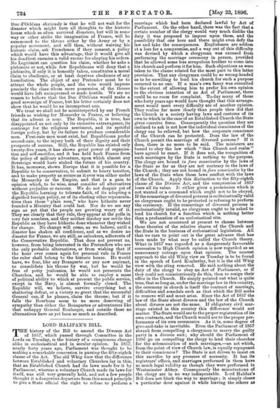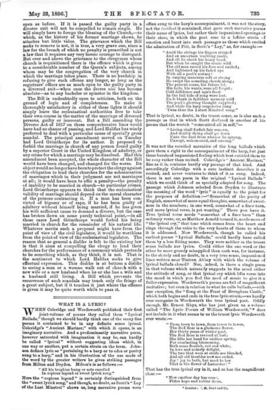LORD HALIFAX'S BILL. T HE history of the Bill to amend
the Divorce Act of 1857, which passed through Committee in the Lords on Tuesday, is the history of a conspicuous change alike in ecclesiastical and in secular opinion. In 1857, nearly forty years ago, Parliament was thought to be making a remarkable concession in passing the fifty-eighth clause of the Act. The old Whig view that the difference between Established and voluntary Churches lay in this, that an Established Church had its laws made for it by Parliament, whereas a voluntary Church made its laws for itself, was still very generally held, and not a few people thought it a dangerous departure from this sound principle to give a State official the right to refuse to perform a marriage which had been declared lawful by Act of Parliament. On the other hand, there was the fact that a certain number of the clergy would very much dislike the duty it was proposed to impose upon them, and the possibility that one here and there might even defy the law and take the consequences. Englishmen are seldom at a loss for a compromise, and a way out of this difficulty was devised by which a clergyman was excused from performing the marriage ceremony in person, provided that he allowed some less scrupulous brother to come into his church and perform it for him. Such objections as were taken to the clause related for the most part to this latter provision. That any clergyman could be so wrong-headed as to be unwilling to lend his church for such a purpose occurred to no one. If a man's own fancy was consulted to the extent of allowing him to prefer his own opinion to the obvious intention of an Act of Parliament, there could be no room for complaint. To-day many of those who forty years ago would have thought that this arrange- ment would meet every difficulty are of another opinion. They realise far more clearly than people then did that the Church is a society having laws and customs of its own to which in the case of an Established Church the State gives coercive force. Consequently the question they are inclined to ask is not how the individual consciences of the clergy can be relieved, but how the corporate conscience of the Church can be protected. Does the law of the Church permit the marriage of divorced persons ? If it does, there is no more to be said. The ministers are bound to obey the law which "this Church and realm" have agreed to enact. If it does not, the recognition of such marriages by the State is nothing to the purpose. The clergy are bound in foro conscientize by the laws of the State so far as they are not contrary to the laws of the Church ; they are not bound in foro conscientize by the laws of the State when these laws conflict with the laws of the Church. Apply this distinction to the fifty-eighth clause of the Divorce Act, and the compromise of 1857 loses all its value. It either gives a permission which is not wanted or a command which ought not to be obeyed. If the remarriage of divorced persons is ecclesiastically valid no clergyman ought to be protected in refusing to perform the ceremony. If the remarriage of divorced persons is ecclesiastically invalid, no clergyman ought to be asked to lend his church for a function which is nothing better than a profanation of an ecclesiastical rite. We are not concerned at present to choose between these theories of the relative shares of the Church and the State in the business of ecclesiastical legislation. All that we care to point out is the great advance that has been made by what may be called the Church theory. What in 1857 was regarded as a dangerously favourable concession to High Church opinion is now regarded as an unnecessary outrage upon that opinion. The nearest approach to the old Whig view on Tuesday is to be found in the speech of Lord Kimberley, but it is the old Whig view with the sting removed. He said nothing about the duty of the clergy to obey an Act of Parliament, or if they could not conscientiously do this, then to resign their office in the Church. He simply pointed out what is quite true, that so long as, under the marriage law in this country, the ceremony in church is itself the contract of marriage, difficulties and scandals such as that which the Bill seeks to remove will and must arise. Since the Act of 1857 the law of the State about divorce and the law of the Church about divorce are not the same. If obligatory civil mar- riage existed in this country this difference would not matter. The State would see to the proper registration of its own contracts, and the Church would see to the proper per- formance of its own ceremonies. As it is, some degree of give-and-take is inevitable. Even the Parliament of 1857 shrank from compelling a clergyman to marry the guilty party in a divorce suit; why should the Parliament of 1896 go on compelling the clergy to lend their churches for the solemnisation of such marriages,—an act which, from the point of view of Church law, is equally repugnant to their consciences ? The State is not driven to insist on this sacrifice by any pressure of necessity. It has its registrars' offices, and marriages performed in them have as much legal validity as though they were performed in Westminster Abbey. Consequently the ministrations of the clergy are in no way indispensable. Lard Halifax's Bill does not block the way to marriage ; it simply closes a particular door against it while leaving the others aS open as before. If it is passed the guilty party in a divorce suit will not be compelled to remain single. He will simply have to forego the blessing of the Church,—to which, as the history of his former marriage shows, he attaches but little value. The grievance which the Bill seeks to remove is not, it is true, a very grave one, since a law for the breach of which no penalty is prescribed is not a law that it requires any very heroic courage to disregard. But over and above the grievance to the clergyman whose -church is requisitioned there is the offence which is given to a considerable number of the Queen's subjects, among whom may be the congregation of the very church in which the marriage takes place. There is no hardship in refusing to give such offence any longer, so long as the registrars' offices are as much open to the guilty party in a divorced suit—when once the decree nisi has become absolute—as to any bachelor or spinster in the kingdom.
The Bill is undoubtedly open to criticism, both on the ground of logic and of completeness. To make it thoroughly satisfactory in either of these lights it should simply leave the ecclesiastical authorities free to take their own course in the matter of the marriage of divorced persons, guilty or innocent. But a Bill amending the Divorce Act of 1857 on these comprehensive lines would have had no chance of passing, and Lord Halifax has wisely preferred to deal with a particular cause of specially gross scandal. The principal amendment moved on Tuesday had Lord Grimthorpe for its author. It proposed to forbid the marriage in church of any person found guilty by a superior Court in the United Kingdom of adultery, or any crime for which a marriage may be dissolved. Had this amendment been accepted, the whole character of the Bill would have been changed, and changed for the worse. Its object would no longer have been to protect the clergy against the obligation to lend their churches for the solemnisation of marriages which in their judgment are not marriages at all ; it would have been to affix a penalty—the penalty of inability to be married in church—to particular crimes. Lord Grimthorpe appears to think that the ecclesiastical validity of marriage should depend on the moral character of the persons contracting it. If a man has been con- victed of bigamy or of rape, if he has been guilty of adultery without himself being married, if he has given his wife sufficient cause to demand a divorce, but the case has broken down on some purely technical point,—in all these cases Lord Grimthorpe would forbid his being married in church for the remainder of his natural life. Whatever merits such a proposal might have from the point of view of the civil legislator, it would be worthless from the point of view of the ecclesiastical legislator. The reason that so general a dislike is felt to the existing law is that it aims at compelling the clergy to lend their churches for the performance of a ceremony which pretends to be something which, as they think, it is not. That is the sentiment to which Lord Halifax seeks to give effectual expression. This dislike is at bottom a dislike to seeing a man or a woman walk out of church with a new wife or a new husband when he or she has a wife and a husband still living. A Bill which prevents the recurrence of such scandals may touch only the fringe of a great subject, but if it touches it just where the offence is given it may be quite worth while to pass it.



































 Previous page
Previous page